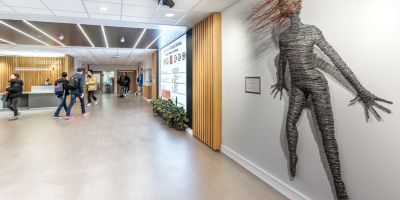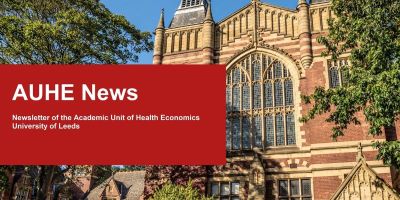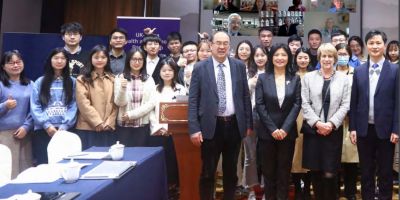Academic Unit of Health Economics - July newsletter

Academic Unit of Health Economics July newsletter features current events and news. To download as a PDF follow the link at the bottom of the page.
Welcome… from our Director, Professor Chris Bojke
We are very happy to welcome several new members of staff Ruben Mujica-Mota, Samuel Frempong and Donna Irving who have joined the team. We would also like to wish Rocio Rodriquez Lopez all the best in her new career as she leaves us to join Public Health Wales. And of course congratulations to Charlotte Kelly who has successfully completed her PhD and joined the University of Hull. It was great to see a strong Leeds presence at the recent successful HESG, brilliantly hosted by UEA. I thought it really reflected the kind of wide-ranging research we do at Leeds with a focus on methodological rigour applied to important research questions with health economics being used to understand and quantify the mechanisms and drivers of costs and benefits rather than simply producing a cost per QALY summary. It has also been a good few months for the teaching side of our output. It was a real pleasure to hear the very positive feedback from a week-long Cost Effectiveness Modelling for HTA course delivered by the team in Lucerne, Switzerland and there are now plans to make this an annual event. Following on from the success of the economic evaluation of tests course delivered last year year, Beth Shinkins will be repeating this well-received 1-day course again on Sept 5th.
New AUHE project: what is the cost-effectiveness of home adaption for older people?
Home adaptations can help promote independence in later life, and the 2015 Government Spending Review increased the budget for Disabled Facilities Grant (DFG) in England from £220m to £431m in 2017/18, with incremental rises up to 2020. Available international evidence indicates benefit from home adaptations for older people, but there is an absence of high quality evidence from UK studies. In addition, there is an absence of evidence on cost-effectiveness of home adaptations. Evidence on cost-effectiveness of home adaptations for older people is critically important as it can help support sustainable commissioning. Furthermore, evidence that highlights how home adaptations should be targeted for particular groups to maximise benefit can help identify how commissioning of services should be refined to provide greatest value for money. Finally, we need more knowledge about the effectiveness of home adaptations in improving health outcomes related to falls. The aim of our study is to provide evidence on the cost-effectiveness of home adaptations for older people, including for those living with different levels of frailty. We will also assess the impact of home adaptations on fallrelated hospital admissions. The study will use routine data from Care and Repair Cymru linked with health and care data in the Secure Anonymised Information Linkage (SAIL) Databank. The study is funded by the Dunhill Medical Trust and is a multi-centre collaboration between the University of Leeds, Swansea University and University of Liverpool. Care & Repair Leeds, Care & Repair Cymru, Care & Repair England, Age UK Leeds and Foundations are partners on the project. Silviya Nikolova (AUHE) is the Principal Investigator on the project. Silviya Nikolova and David Meads lead on the health economics component of the study.
Welcome to:
Ruben Mujica-Mota
Ruben joined the AUHE as an Associate Professor in Health Economics in May 2019. He is an applied econometrician and health economics decision modeller. He has previously held a senior lecturer post at the University of Exeter where he led a team of mathematical modellers, systematic reviewers, information specialists and statisticians producing evidence for informing NICE guidelines. Ruben’s main research interest is the use of observational data to evaluate the effectiveness and cost-effectiveness of treatments commonly used in routine practice, especially in orthopaedics, cardiovascular disease, and oncology. He is currently working with linked data from electronic medical records to evaluate the use of statins in older patients and evaluating the impact of obesity on retirement decisions using mediation analysis. He is interested in supervising PhD students investigating the relationship between labour supply and health, and methods of big data analysis for drawing causal inference and explaining demand for health care services.
Samuel Frempong
Samuel is a pharmacist, health economist and a researcher interested in a wide range of research topics, such as economic evaluations conducted at the early phases of medical technologies development (particularly diagnostic tests), medical test evaluation, decision analytic modelling, priority setting in low and high income countries and universal health coverage. He is currently working on the SOMAscan Health Insight project which aims to determine whether the use of the SOMAscan Health Insight report is cost-effective compared to usual care on shortterm costs and benefits in primary care patients identified as pre-diabetic and eligible for the NHS Diabetes Prevention Programme (NDPP) but have previously declined to participate.
Donna Irving
Donna joined AUHE in February 2019 as an information specialist. Prior to this she ran the health studies section of the library at the University of Bradford, supporting both the teaching and research requirements of the Faculty of Health Studies. She was a member of the Health Studies faculty research committee which set the research agenda, and developed and delivered the University library research offer. She acted as Information Specialist on various research projects. She has taught systematic review searching, critical appraisal skills and digital information literacy and holds Fellowship of the Higher Education Academy.
AUHE Portfolio: end of life care
AUHE has recently expanded their portfolio of projects in palliative medicine. Yorkshire Cancer Research have invested £1.4 million in a trial to investigate the effectiveness and cost-effectiveness of a primary care needs assessment tool to manage the needs of people with cancer in palliative care. The trial is a collaboration between the University of Leeds and the Wolfson Palliative Care Research Centre at the University of Hull. David Meads is a co-investigator and will lead the economic evaluation. He is also lead health economist on other projects in this portfolio including the IMPACCT study (NIHR PGfAR evaluating pain management at the end of life) which will report soon and the ActMed (NIHR HS&DR project exploring access to medicines at the end of life) study. Finally, in a new collaboration with the University of Sheffield and Marie Curie, David Meads and Ed Webb will evaluate a possible change in the Personal Independence Payments (PIP) policy for those at the end of life.
PhD News: Katie Spencer
Katie is a Clinical Lecturer in AUHE, she splits her time between her role in Clinical Oncology at the Leeds Cancer Centre and her academic position in the AUHE and Leeds Institute of Data Analytics. Katie has just submitted a three year MRC funded Clinical Doctoral Training Fellowship investigating the cost-effectiveness of palliative radiotherapy treatments, assessing how these treatments are used across the English NHS and how novel treatments might be commissioned to ensure cost-effective implementation. She is also working on a EuroQoL funded study assessing the role of longitudinal EQ-5D data to predict prognosis in advanced incurable cancer and also the collaborative HERO (Health Economics in Radiation Oncology) project between the Royal College of Radiologists and European Society of Therapeutic Radiation Oncology.
AUHE Teaching
Bethany Shinkins taught on the MSc Evidence Based Medicine module “Diagnosis and Screening” at the University of Oxford, on February 6-8. On April 4, she presented at the Optima Investigator meeting at the British Library. Bethany also gathered with 60 other researchers at Jesus College Cambridge, on April 8-12, for the 2nd CanTest International School for Cancer Detection Research in Primary Care. At this event, Bethany led a health economics workshop for all of the junior faculty who do research in primary care diagnostics.
Judy Wright was an invited lecturer on the Nottingham Systematic Review Course 18-21 June 2019 organised by the Centre for Evidence-based Hand Surgery and Cochrane Schizophrenia Group, University of Nottingham. Judy ran workshops and lectured on literature search and reference management methods for systematic reviews. David Meads, Daniel Howdon and Bethany Shinkins taught on the “Cost Effectiveness Modeling for HTA” course in Lucerne, Switzerland, on June 24-28. This course served as an introduction to the concepts of health technology assessment and economic evaluations in health.
Chris Bojke was a tutor at the course “Analysing Patient-Level Data using Hospital Episode Statistics (HES)” organised by the University of York, which took place on July 8-10.
AUHE International Collaborations
Alison Smith has been appointed as an expert/consultant for the European Federation of Clinical Chemistry and Laboratory Medicine (EFLM) Working Group on Test Evaluation and on the EFLM Task Group on Performance Specifications based on Outcome Studies (EFLM TG-PSOS). Alison’s main role within these groups will be translating and developing her PhD work in which she has been exploring methods for simulating the impact of test measurement uncertainty (i.e. systematic and random variation in test measurements) on downstream outcomes, such as clinical accuracy, clinical utility and cost-effectiveness. A methodology review Alison completed on this topic has recently been accepted for publication in Clinical Chemistry (in press). Alison’s collaboration with the EFLM groups has resulted in plans to develop case studies over the next year exploring the type of methods used in her PhD, alongside the more traditional approaches to setting performance goals for tests in the laboratory. In addition, she will visit other members of the TG-PSOS group based in Sydney later in the year, to explore further potential future collaborations.
Full newsletter including events and papers
Download the full newsletter including events, key dates, and further news here.




